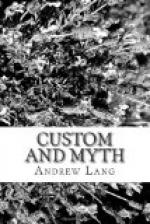{226} See essays on ‘Apollo and the Mouse’ and ’The Early History of the Family.’
{230} Here I may mention a case illustrating the motives of the fetich-worshipper. My friend, Mr. J. J. Atkinson, who has for many years studied the manners of the people of New Caledonia, asked a native why he treasured a certain fetich-stone. The man replied that, in one of the vigils which are practised beside the corpses of deceased friends, he saw a lizard. The lizard is a totem, a worshipful animal in New Caledonia. The native put out his hand to touch it, when it disappeared and left a stone in its place. This stone he therefore held sacred in the highest degree. Here then a fetich-stone was indicated as such by a spirit in form of a lizard.
{233a} Much the same theory is propounded in Mr. Muller’s lectures on ‘The Science of Religion.’
{233b} The idea is expressed in a well known parody of Wordsworth, about the tree which
’Will grow ten times as tall
as me
And live ten times as long.’
{236} See Essay on ‘The Early History of the Family.’
{241} Bergaigne’s La Religion Vedique may be consulted for Vedic Fetichism.
{247a} Early Law and Custom.
{247b} Studies in Ancient History, p. 127.
{248} Descent of Man, ii. 362.
{249} Early Law and Custom, p. 210.
{250a} Here I would like to point out that Mr. M’Lennan’s theory was not so hard and fast as his manner (that of a very assured believer in his own ideas) may lead some inquirers to suppose. Sir Henry Maine writes, that both Mr. Morgan and Mr. M’Lennan ’seem to me to think that human society went everywhere through the same series of changes, and Mr. M’Lennan, at any rate, expresses himself as if all those stages could be clearly discriminated from one another, and the close of one and the commencement of another announced with the distinctness of the clock-bell telling the end of the hour.’ On the other hand, I remember Mr. M’Lennan’s saying that, in his opinion, ’all manner of arrangements probably went on simultaneously in different places.’ In Studies in Ancient History, p. 127, he expressly guards against the tendency ’to assume that the progress of the various races of men from savagery has been a uniform progress: that all the stages which any of them has gone through have been passed in their order by all.’ Still more to the point is his remark on polyandry among the very early Greeks and other Aryans; ’it is quite consistent with my view that in all these quarters (Persia, Sparta, Troy, Lycia, Attica, Crete, &c.) monandry, and even the patria potestas, may have prevailed at points.’
{250b} Early Law and Custom, p. 212.
{251} Studies in Ancient History, pp. 140-147.
{252} Totem is the word generally given by travellers and interpreters for the family crests of the Red Indians. Cf. p. 105.




